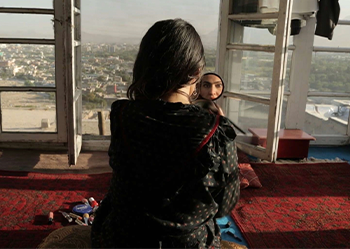University News Last updated 13 April 2024

Film lovers can experience the best of South Asian independent cinema during a special screening at the Flatpack Festival next month, curated by ̽��ֱ�� (BCU) Professor in Digital Arts.
will celebrate the diverse voices in South Asian filmmaking, by showing a selection of award-winning independent films handpicked by film historian and BCU Professor, Valentina Vitali.
“With a showcase of seven short films by contemporary filmmakers based in Afghanistan, Pakistan, Bangladesh, Myanmar, and India – mostly young directors, five of whom are women – we want to spark interest in a new kind of South Asian cinema for the British public.” Professor Vitali explains.
“Beyond Bollywood features a small selection of filmmakers whose work I have come across over the years, either in their country or at festivals. Technology to make films has become more accessible. What’s missing are venues and opportunities for independent films to be seen widely.
“My hope is that the more opportunities audiences are given to watch films by contemporary South Asian filmmakers, the more independent South Asian films they will want to see.
“The powerful players in the film industry are in the business of making money. Change will not come from them, unless they stand to make a profit. Change will have to come from audiences.
“As viewers, we should all feel that responsibility – let alone that we owe it to ourselves not to let algorithms chose for us. Events like Beyond Bollywood give us the chance to do just that.”
The screening will take place on 15 May, 5.30-7.30pm, at the Mockingbird Cinema. It will be followed by a Q&A with filmmakers Shunn Lei Swe Yee and Saw Eh Doh Poe, from Myanmar.
BCU students can take advantage of a special discounted rate of £2.50 per ticket.
“As a rule, when audiences think of cinema in South Asia, they think of big-budget Hindi films,” Professor Vitali continues. Pakistan, Bangladesh, and Sri Lanka all have large film industries releasing hundreds of films every year. So did, until recently, Myanmar and Afghanistan.
“̽��ֱ�� Indian Film Festival, Tongues on Fire Festival, and Flatpack Festival have done a lot to promote this other kind of South Asian cinema. But the power of mainstream distributors and streaming platforms is such that British audiences remain largely unaware of the variety and richness of the cinema made in Pakistan or Bangladesh, let alone in smaller countries like Bhutan or Nepal.
“In the Global North, public opinion tends to assume that filmmakers from the Global South are ‘still catching up’, and that films are of lower quality.
“Today, even in countries where independent artists are at risk, and where women are constitutionally marginalised, filmmakers, including women, succeed in making films that are often of higher quality than the content sold by powerful distributors.
“It’s not so much a matter of these filmmakers’ courage. It’s a question of audiences developing the awareness that these films from South Asia say something to and about us, here, in the Global North.”
“That’s why I research and write about cinema in South Asia, and especially about women’s cinema there. I want to see more of it and would like others to be able to do the same. Researching, writing, and programming events like Beyond Bollywood are the tools at my disposal to achieve that.”
This event has been supported by the Arts and Humanities Research Council.
Read more about into South Asian Women's Cinema.��